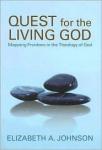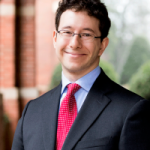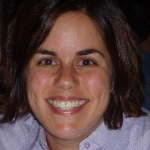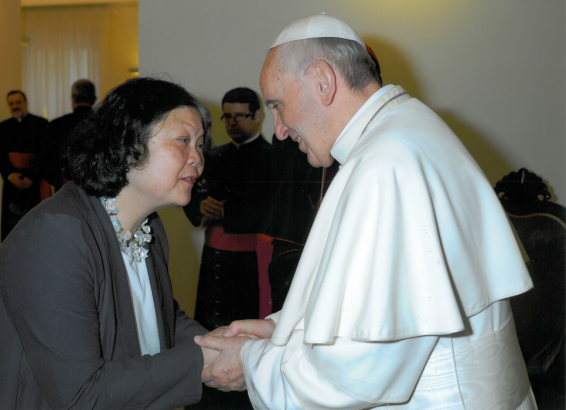 Interesting statement of support for sister Johnson from the College Theology Society.
Interesting statement of support for sister Johnson from the College Theology Society.
About The Author
Thomas Bushlack
Thomas J. Bushlack (Ph.D., University of Notre Dame) is an assistant professor of moral theology at the University of St. Thomas in St. Paul, MN. He recently defended his dissertation titled Justice in the Theology of St. Thomas Aquinas: Rediscovering Civic Virtue, and he is also an Oblate of St. Benedict – a lay person who has taken vows to study and practice the Benedictine way of life based on the Rule of St. Benedict. His teaching and research interests include virtue ethics, social ethics, natural law, political theology, and the theory and practice of connecting contemplation and action.
Related Posts
4 Comments
Leave a reply Cancel reply
You must be logged in to post a comment.
Contributors
-

Alessandro Rovati
1 Post -

Andrew Kim
9 Posts -

Barrett Turner
0 Posts -

Beth Haile
173 Posts -

Book Reviews
10 Posts -
Catherine Moon
0 Posts -

Charles Camosy
141 Posts -

Christopher Vogt
38 Posts -

Conor Kelly
48 Posts -

Dana Dillon
52 Posts -

David Cloutier
215 Posts -

Emily Reimer-Barry
161 Posts -

Holly Taylor Coolman
2 Posts -

Jana Bennett
161 Posts -

Jason King
142 Posts -
Jennifer Beste
0 Posts -

Jessica Wrobleski
7 Posts -

John Berkman
15 Posts -
Julie Rubio
38 Posts -

Kari-Shane Davis Zimmerman
2 Posts -

Kathryn Getek Soltis
36 Posts -

Kelly Johnson
17 Posts -

Lorraine Cuddeback-Gedeon
11 Posts -

Luis Vera
3 Posts -

Maria Morrow
41 Posts -

Matthew Shadle
60 Posts -

Meghan Clark
111 Posts -

Miguel J Romero
11 Posts -

New Wine New Wineskins
22 Posts -
Nichole Flores
6 Posts -

Patrick Clark
124 Posts -

Ramon Luzarraga
14 Posts -
Shawnee
0 Posts -
superchief1
1 Post -
Thomas Bushlack
69 Posts -

Tobias Winright
59 Posts



Yesterday, Cardinal Wuerl issued what was essentially a response to the CTSA statement: http://www.usccb.org/doctrine/BISHOPS-AS-TEACHERS-%20CARDINAL-WUERL-4-18-11.pdf
Two very basic points were made that I think are thought-provoking. The first is that that the COD is in interested in dialogue between bishops and theologians, but (though the document leaves other options open) the only suggestion that seems to be given is that of the theologian seeking an imprimatur. Second, the document makes an interesting analogy to sports. It says that the theologian is like the tennis player and bishops are like the referee.
Avery Cardinal Dulles recognized that there are ‘two magisteria’ in our tradition: that of theologians and that of bishops. I wonder how this insight informs the two points above? Might this insight aid the creation of a genuine dialogue?
Hopefully this unfortunate situation will serve as an impetus to work harder at attaining this important goal…rather than form even harder battle lines which push against it.
Interesting analysis of the sports analogy over at dotCommonweal:
As a Mavs fan who had to watch our one title opportunity handed to Dwayne Wade due to Ref Bennett Salvatore’s total incompetence, I think the referee analogy is not exactly what we are looking for in the bishop/theologian relationship. Maybe a better analogy have the bishops serving as the coach and the theologians serving as the NBA players. The coach has a certain authority, but the players are playing at such a high level of competence that they are given a certain degree of autonomy in the game, so long as the common good (i.e. the good of the team) is preserved. Occasionally, a player will get benched, but again, only if it serves the good of the team as a whole.
Obviously, I have too much basketball on the brain now.
While I generally find the back-and-forth over these kinds of controversies extremely disheartening (because of the potential for polarization, on both sides), it may be that this particular situation is proceeding in a more enlightening fashion. Besides Johnson’s reply, which was really a model of charity, we now have Cardinal Wuerl’s interesting and careful further response.
Leaving aside the sports analogy, I found two things of interest in his reply. One is the lengthy discussion of the fact that the text is designed for use in undergraduate classes, and so merits special scrutiny. I can understand this claim, but I wonder if the Cardinal would benefit from some time “in the trenches.” Setting aside specific claims about the book, one wonders what the bishops assume about how undergraduates who are “undercatechized” will best be led into deeper reflection on the theological tradition. Undergraduates are notoriously imprecise, and so whether they can detect some of the supposed “errors” of the book is a real question. But more deeply, there is a raft of sociological evidence (e.g. Robert Putnam’s recent book, Christian Smith’s amazing work) which suggests that the typical young adult shows a very strong allergy to strong religious truth claims. How is one best to lead such an undergraduate deeper into faith? I think there is a real pedagogical challenge here, and one might at least raise the question of whether books like Johnson’s, which do not “start with the truths of revelation,” might be of use in this task, even if one does not agree with all of their claims. This may also be true with books of liberation theology. I don’t mean to offer a defense of their claims (or a critique!) – I just wonder if the bishops understand the challenges of the pedagogical task of teaching reluctant undergraduates in college theology classes. (Having said this, there are undoubtedly wonderful books that might be used with which the Cardinal has no problem – I simply mean to say that the “danger” which the Cardinal suggests may miss the point that a book like Johnson’s may succeed in drawing some students deeper into the faith, without necessarily committing them to the supposed “errors” which the Committee on Doctrine detects.)
The second claim I found interesting, on pp. 9-10, is the depiction of two fundamentally different stances toward theological work, which form the self-understanding of the theologian. According to the Cardinal, the theologian can understand him/herself as “servant of the truth” – thus aligning themselves with the proposed understanding of the bishops – or one can propose “a different gospel which is no longer salvific.” This strikes me as quite a vivid distinction, and helpful – though it does suggest some rather grave implications. Does the Cardinal think that Beth Johnson is proposing “a different gospel” from the bishops? I mean, I can frankly understand why, to use one example, some of the most Marxist of liberation theologies might be criticized under this dichotomy. That is to say, it is possible to maintain that some works may in fact allow Marxist methods of analysis to shape the Gospel, rather than the other way around (that is, bend Marxism to serve the Gospel) – (BTW, this is a blog, and so the preceding claim is offered merely as a handy illustration, not as anything pretending to be a full analsys!!). But it is surely more difficult to understand Beth Johnson’s work in this way – or perhaps those who have concern over the magisterial teaching on certain moral issues. Is it possible, using this dichotomy, to imagine theological work with which one might disagree, and even find misleading, without suggesting that it proposes “a different gospel”? Or does all work fall into one of these two versions of self-understanding? Again, my experience (this time of the theological world) suggests to me that things are not that simple. The Cardinal is certainly right that some theological work may in fact propose a “different gospel,” and I actually find this category helpful in naming theological work that proceeds (more or less) to produce a theological framework discontinuous with the tradition. However, I wonder if the bishops might find a better way to characterize work with which they disagree, or work they think is weak, without creating this strong of a dichotomy.
I have a few thoughts/questions:
1. The imprimatur: I’m curious about peoples’ experiences with this so far. Does anyone here (poster or commenter) know an academic who has requested an imprimatur? And if so, how did that work in regard to tenure requirements?
I know one person who requested an imprimatur, and he was a priest and NOT in academia. Other than that, I’ve not once been in a conversation about imprimaturs. I think the “mandatum” was the main conversation I’ve ever had with academics about relationships with bishops. I’m not against imprimaturs – on the contrary, if that would help engage conversation, maybe it’d be better all around – but it isn’t clear to me how to relate that to academia especially in relation to tenure schedules. It already takes a couple years (at best) to publish a book; I presume an imprimatur would take another year or two – would this mean fewer Catholics would/could get tenure? Would Catholic schools need to change their policies, at the risk (or benefit depending on view) of going down a few notches in terms of national prominence? Would that matter?
And then there are other levels of thought here: the archbishop mentions that theologians have academic freedom to raise questions, even to question whether a “ball is out of bounds” – but if a bishop were to say that the ball was out of bounds, to continue the sports metaphor, and did not issue an imprimatur, would we then never publish the work? Would there be different considerations if a book were deemed academic as opposed to for lay readers? And, of course, one never quite knows how readers will respond to books – some “academic” ones have become quite popular and vice versa…. (On this, I think Wuerl has a fair point – that once a book’s been published, it’s open for public discussion. That said, I think he might be downplaying how different it is to have public comment by a college of bishops versus public comment by one person, usually not a bishop, doing a review. I still wish they’d at least notified Sr. Johnson of the discussion they were having. In academia, people often do each other the courtesy of at least telling another that they’re writing something against another’s argument – and send drafts, et cetera.)
So a related question I have about imprimaturs is historical: how were they seen/used pre Vatican II (I am presuming, perhaps wrongly, that use of the imprimatur dipped quite a bit after Vatican II)? And how did that link to a priestly/religious culture in academia, versus the “lay person as theologian” we have now? I’m likewise thinking of the very different culture in academia that existed then regarding tenure.
2. Dave – what you write reminds me of when I was in college (and generationally, I’m probably a bit more like students today than I am like students in the bishops’ school days) – the chaplain at my (secular) college had a ministry going that was directed toward getting people to fall in love with Jesus and want to keep following him. In that context, we had all kinds of amazing conversations after our customary evening prayer – including why the church views abortion as wrong, questions about homosexuality and the like. It was designed for getting our thoughtful college selves to think seriously about faith and faith claims, at a college level. But then, the diocese mandated that we switch to a catechism-based model. That was too much for many students – they didn’t see a way to enter in to the community. It was exactly the right kind of program for students who had grown up in very strong Catholic homes – but most students were not in that arena. So there’s a problem of trying to reach very diverse student populations when it comes to the faith.
3. Dave, I just don’t see quite the stark dichotomy that you’re wanting to put on Archbishop Wuerl in your second point. I think that was because of the way he was also talking about academic freedom, alongside his points about the gospel.